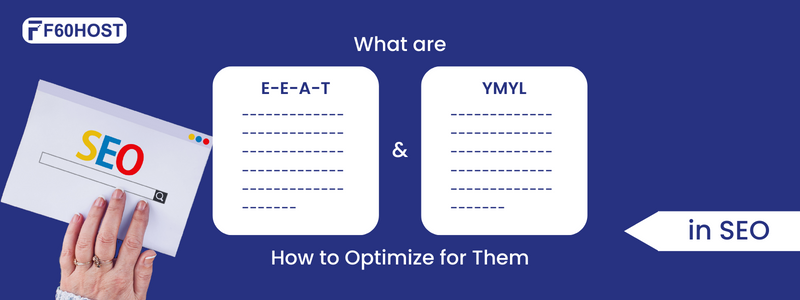What Are E-E-A-T and YMYL in SEO & How to Optimize for Them

E-E-A-T stands for “Experience, Expertise, Authoritativeness, and Trustworthiness” and YMYL stands for “Your Money or Your Life.” If you want to boost your SEO, it is essential to comprehend both ideas.
What Is E-E-A-T?
E-E-A-T (Experience, Expertise, Authoritativeness, and Trustworthiness) is a component in Google’s Search Quality Rater Guidelines—the manual used by real people to assess the quality of search results. They are referred to as quality raters. Additionally, their comments aid Google in evaluating the effectiveness of algorithm improvements. E-E-A-T is not a direct ranking factor in Google. However, Google prefers to serve results with a high E-E-A-T. As a result, it is a significant notion in SEO. Furthermore, strong E-A-A-T can boost user confidence. and boost your website’s conversion rate. Let’s now examine how your content interacts with the four Google E-E-A-T components.
Experience
Good material frequently shows the author’s first-hand familiarity with the topic. This demonstrates that ideas have been tried and tested. And that the insights are real. Take a look at this evaluation of the board game Wingspan. The author discusses their individual viewpoints and experiences. and offers distinctive product images as evidence that they have actually played the game.
Expertise
Authors’ subject matter expertise must be determined by search quality raters. Do they possess the expertise, credentials, and background necessary to provide accurate information?
Experience and expertise frequently overlap. However, they are not the same.
Take the subject of money management.
Authoritativeness
Expertise is a stage below authoritativeness. Even if you have official schooling and real-world experience, do people regard you as the foremost authority on the subject? You need to establish an excellent reputation in order to pass this test. Do you educate, certify, or train professionals in your industry? Do you rely on other professionals?
Trustworthiness
The most crucial aspect of Google E-E-A-T SEO is reliability. The author, the content, and the website must all be considered by quality raters. Clarify who wrote your information, check it for factual correctness, credit reliable sources, and don’t bury it in a sea of adverts. But keep in mind that this goes beyond merely content marketing.
Google describes “a shopping checkout page that has an insecure connection” as being unreliable in the Search Quality Rater Guidelines.
What Is YMYL?
The health, financial security, safety, or general well-being of readers could be greatly impacted by YMYL (Your Money or Your Life) themes. Current events, medicine, and money are all typical YMYL themes.
For YMYL SEO, E-E-A-T is crucial since false information on these subjects might impact the following:
- The viewer of the content
- Others impacted by the viewer of the content
- groups of persons whose activities were influenced by content viewers
How to Make Your Website E-E-A-T

Here are six doable measures to boost the E-E-A-T SEO of your website:
1. Create High-Quality Content
Content on your website should put people first. This refers to information that leaves the reader satisfied, offers guidance, and addresses their questions. Make sure your content is always valuable and has a high degree of E-E-A-T by regularly auditing it. Your content won’t be as helpful if it contains out-of-date information, even if it was once beneficial. Additionally, develop fresh material that meets the changing needs of your audience.
2. Provide transparency and author information
Google wants to know that a piece of content is being written by a reliable source of information. Make sure to include a team introduction on your website’s About Us page, if necessary. in addition to unique author pages to showcase particular authors.
3. Use Reputable Sources
To create credibility, it is usually ideal to go straight to the source when developing content. Always include links to official sources, studies, research papers, and so forth. This includes tweets and blog articles from professionals in your sector. It’s also a good idea to stick to reliable sources. Academic databases, journalistic outlets, and the websites of established specialists and agencies are examples.
4. Build a Positive Brand Image
The reliability of your content and site as a whole might be influenced by the reputation of your brand. As a result, online reputation management is essential for Google E-E-A-T SEO. This indicates you should be on the lookout for bad feedback or press. If something does arise, reply quickly and professionally.
5. Track and Use User-Generated Content
User-generated content (UGC) is any sort of content created by individuals rather than brands. When handled correctly, UGC can serve as a trust signal and foster brand loyalty. For example, 79% of internet consumers say user-generated content has a significant impact on their shopping decisions. As a result, getting your consumer base to support your brand is critical. Images, video testimonials, product reviews, YouTube videos, and blog postings are all examples of UGC.
UGC is classified as Main Content (MC) by Google, which defines it as “any part of the page that directly helps the page achieve its purpose.” According to the rules, any information on a webpage can be divided into three categories: MC, Supplementary information (SC), and Advertisements/Monetization (Ads).
6. Create Credible Backlinks
Backlinks from other trustworthy websites are an important aspect of your SEO strategy. Furthermore, it might demonstrate that your company is an authority in your sector. WWF links to a lot of lesser brands in the example below. Because the WWF is a global authority, obtaining a backlink from them is a major stamp of approval.
Conclusion
When it comes to YMYL inquiries, Google goes to tremendous measures to try and only rank the most reliable and useful content. You may often get valuable insights into where and how to concentrate your efforts on increasing E-E-A-T by understanding the environment in which you wish to rank, as well as how Google’s quality raters are instructed to evaluate that picture.
Need to know more? Then follow us at F60 Host
